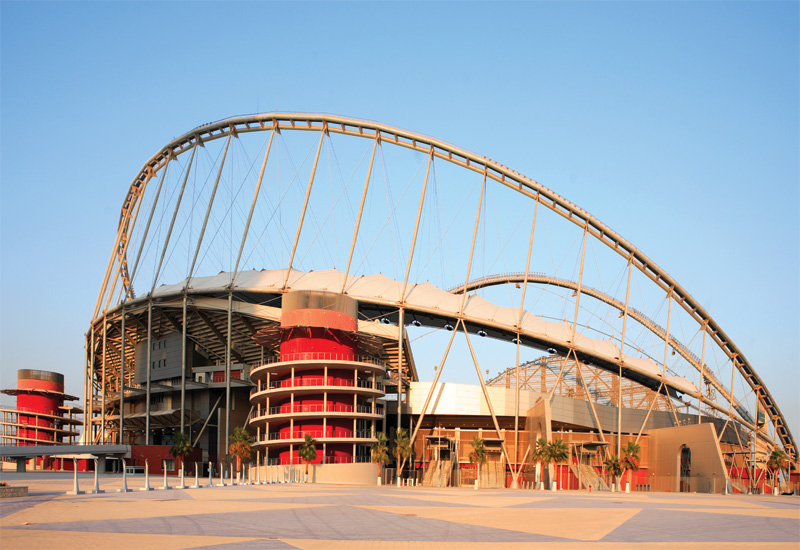Two of the Gulf’s most prominent engineering consultancy firms have said they are confident about winning contracts in Qatar in the lead up to the World Cup.
WSP and Atkins, both of which already have a presence in Qatar, are hoping to be involved in some of the state’s largest projects coming online now that FIFA has named its host country.
Atkins’ country director for Qatar, Gordon Jack, confirmed the company is involved in World Cup projects already and referred to a focus on infrastructure developments in the future.

| Advertisement |
“We are already working with several Qatari Government bodies on projects that have a programme that is related to the World Cup,” Jack asserted.
“We see the impact of the win as an opportunity for us to increase our involvement in rail and infrastructure projects and to reinvigorate the building construction programme.”
Supply Issue
But although the official FIFA report said that Qatar currently attracts around one million visitors a year, and is aiming to grow visitor numbers by 20% over the next five years, the country is already suffering from an oversupply problem. It will have to develop a clear strategy to avoid exacerbating the problem in the interim.
Ultimately, one of the solutions would be to see Qatar concentrating its tourism efforts on sports — creating a real marketing focus for the government, explained consultancy company Viability’s partner and general manager Guy Wilkinson.
“Qatar is to some extent following Oman’s strategy of selective tourism, and is looking to capitalise on sports and cultural tourism, together with MICE business, rather than aiming at mass tourism,” he said.
“The Qatari government has been on record promising 140 new hotels to serve the games. Qatar, therefore, has 12 years to build up other tourism facilities that will take up the slack of hotel demand when the football fans have gone home. It’s a long time and with the wealth at their disposal, the Qataris certainly have the potential to achieve this,” Wilkinson added.
But with any large sporting event, there is often a great deal of initial investment, with little consideration for what will happen when the event is over.
“Qatar will face similar issues as other countries have been facing in terms of what you do with all the inventory once the event is over,” said Jones Lang LaSalle Hotels regional director and head of real estate inventory, Jalil Mekouar.
However, in the case of Qatar, Al-Emadi argued that the hotels built would be able to sustain themselves even after the end of the World Cup.
“The World Cup is not tomorrow or next year, we are talking 10 years plus. On average, any country which has a strong economy, they are going to have growth and it depends in which sector, but whatever sector the government is planning to grow, this is part of the country’s growth so there will definitely be a need [for more hotels],” he asserted.
Looking beyond Qatar, hoteliers said that the World Cup would make a difference to tourism in the surrounding countries.
“This will have a huge impact on tourism in the region,” said Mike Scully, managing director at Seven Tides. “This will be the World Cup of the Middle East as opposed to the World Cup of just Qatar.”
Scully pointed to Bahrain’s hosting of the 2010 Grand Prix and the massive number of spectators who commuted from Dubai to watch the event as an indicator of how FIFA’s much-larger World Cup - arguably the biggest sporting event in the world behind the Olympics - could spur local tourism.
And next door, the proposed causeway linking Bahrain and Doha could propel tourism on the island nation. Manama and surrounds could provide a haven for spectators who choose to stay in the comparatively liberal country and commute to Qatar for matches.
Crawford also cited the World Cup’s effect on tourism as something which surrounding countries would potentially benefit from.
“I think this wonderful achievement is good news for the hospitality industry across the region and whilst Qatar will clearly be the first choice destination for many fans, others will choose to combine a visit to the World Cup with a holiday nearby, perhaps in Dubai, Abu Dhabi or Bahrain,” he said.
Qatar: a sporting nation?
Football history: The national team played its first match against Bahrain in 1970 and has since gone on to win the Gulf Cup twice - in 1992 and 2004. However, the team has never progressed beyond the group stage in continental football championships.
Notable sporting events: Qatar was selected to host the 15th Asian Games in 2006; the first city in the region to host the event.









 Search our database of more than 2,700 industry companies
Search our database of more than 2,700 industry companies









